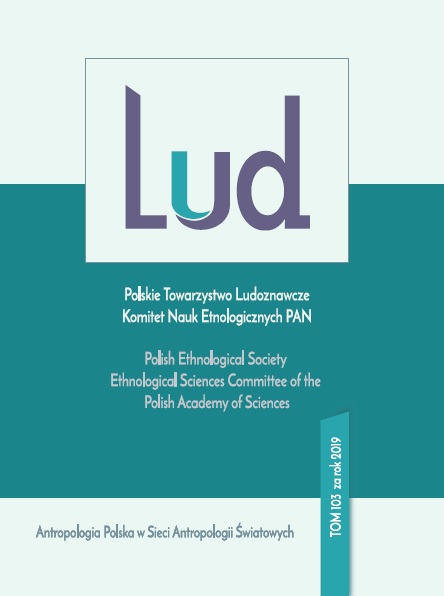“Are we still a family?” The perspective from Romanian transnational families
DOI:
https://doi.org/10.12775/lud103.2019.03Ключові слова
transnational families, kinship, family practices, Romanian society, “diffuse” familyАнотація
In 2015 the Romanian anthropologist Vintilă Mihăilescu wrote about the practice of migration in the case of the Romanian society, showing how it is ultimately deeply rooted, before 1989, in the communist period. Under the pressure of internal migration from villages to cities, the traditional Romanian family suffered a major structural transformation. According to the Romanian anthropologist, the diffuse family – household, as he calls it, seems to be “the grandmother” of the transnational family. The current practices of transnational families were formed based on these roots, of the “diffuse” family. Starting from the idea of Mihăilescu, the aim of this articleis to investigate the main (re)structures of the kinship practices in the Romanian society under the impact of external migration after 1989. One of the findings of the study shows that in the Romanian traditional society, preserving kinship cohesion meant a series of obligations and liabilities that were often transmitted from one generation to another without being questioned. They basically constituted and maintained the channel of communication between family members. The members of transnational families have absorbed these traditional structures, weaving over new formulas to adapt family practices(Morgan: 2011) to the specificity of transnational living, reformulating at the same time the traditional rules of kinship and adapting them to the new way of living. The study is based on materials derived from a qualitative research in five communities— three in Romania and two abroad.Посилання
Anghel, R.G. (2008). Migraţia şi problemele ei: perspectiva transnaţională ca o nouă modalitate de analiză a etnicităţii şi schimbării sociale în România. Working Papers. Cluj Napoca: ISPMN Publishing.
Baldassar, L., Baldock, C., Wilding, R. (2007). Families caring across borders: Migration, ageing and transnational caregiving. New York: Palgrave MacMillan.
Deleuze, G., Guatarri, F. (2000) [1972]. Anti-Œdipus. Capitalism and Schizophrenia. Trans. Robert Hurley, Mark Seem and Helen R. Lane. London and New York: Continuum.
Eliade, M. (1959). The Sacred and the Profane: The Nature of Religion. London: Harcourt Brace Jovanovich.
Heller, W. (1998). Romania: Migration, Socio-economic Transformation and Perspectives of Regional Development. München: Südosteuropa-Gesellschaft (SüdosteuropaStudien, 62).
Herrera Lima, F. (2001). “Transnational Families: Institutions of transnational social space”. In L. Pries (ed.) New Transnational Social Spaces. International migration and transnational companies in the early twenty-first century. London: Routledge, pp. 77-93.
Hossu, I.E. (2018a): Relațiile de înrudire. Căsătoria – atitudini, practici și dinamici/Study of Kinship Relations. Marriage – Attitudes, Practices. Cluj: Mega.
Hossu, I.E. (2018b). “Our Westerner”: The Role of Romanian-naturalized Youth in Reconfiguring Moldavian Transnational Families. 10.1007/978-3-319-90942-4_5.
Hossu, I.E., Ducu, V. (2017). Departe și totuși aproape: fragmente din viața familiilor transnaționale. Cluj: Mega.
Kligman, G. (1998b). Nunta mortului: ritual, poetică şi cultură populară în Transilvania. Iaşi: Polirom.
Kligman, G.. (1998a). The Politics of Duplicity: Controlling Reproduction in Ceausescu's Romania.
Berkeley: University of California Press.
Mauss, M. (2016). The Gift (Selected, annotated, and translated by Jane I. Guyer). Chicago: HAU Books. (Original work published 1925).
Mihăilescu, V. (2015). “Familie, case şi migraţiune”. Sinteza, 25.12.2015. http://revistasinteza.ro/familie-case-si-migratie/ [Accessed 15.08.2019].
Morgan, D. H. J. (2011). Rethinking Family Practices. London: Palgrave Macmillan.
Parutis, V. (2011). “"Home" for Now or "Home" for Good?: East European Migrants’ Experiences of Accommodation in London”. Home Cultures 8(3): 265-296.
Sandu, D. et al. (2006). Locuirea temporară în străinătate migraţia economică a românilor : 1990-2006. Fundația pentru o Societate Deschisă: București.
Scurtu, V. (1966). Termenii de înrudire în limba română. Bucureşti: Editura Academiei Republicii Socialiste România.
Stahl, H. H. (1936). “Rudenie spirituală din Năşie, la Drăguş”. Sociologie românească 1(7-9): 25-36.
Șeuleanu, I. (1995). Dincoace de sacru, dincolo de profan: (studii şi eseuri de folclor). Târgu Mureș: Tipomur.
Downloads
Опубліковано
Як цитувати
Номер
Розділ
Ліцензія
1. Autorzy udzielają wydawcy (Polskiemu Towarzystwu Ludoznawczemu) licencji niewyłącznej na korzystanie z utworu w następujących polach eksploatacji:
- utrwalanie Utworu/przedmiotu prawa pokrewnego;
- reprodukowanie (zwielokrotnienie) Utworu/przedmiotu prawa pokrewnego drukiem i techniką cyfrową (ebook, audiobook);
- wprowadzania do obrotu egzemplarzy zwielokrotnionego Utworu/przedmiotu prawa pokrewnego;
- wprowadzenie Utworu/przedmiotu prawa pokrewnego do pamięci komputera;
- rozpowszechnianie utworu w wersji elektronicznej w formule open access na licencji Creative Commons (CC BY - ND 4.0).
2. Autorzy udzielają wydawcy licencji nieodpłatnie.
3. Korzystanie przez wydawcę z utworu na ww. polach nie jest ograniczone czasowo, ilościowo i terytorialnie.
Stats
Number of views and downloads: 586
Number of citations: 0



